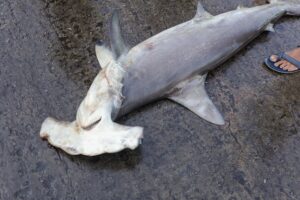Shark Confusion Leaves Fishers In Tamil Nadu Fearing Penalties

Sharks caught by fishers from Thoothoor, a coastal village in southern India. The slight visual differences between certain protected and unprotected shark species are contributing to tensions between this renowned shark fishing community and the local authorities (Image: Jeff Rotman / Nature Picture Library / Alamy)
Thengapattanam’s coast bustles on weekday mornings, even when the rain is unrelenting. The largest fishing harbour in Kanyakumari district on the southern tip of India, its air is thick with calls and conversations between merchants and boat owners.
The local fishers are on edge. An incident in August has highlighted the ongoing tensions surrounding wildlife protection in India, in particular the struggle to differentiate between species of shark. It could result in them being inadvertently fined or even dragged into court.
Thengapattanam is the nearest harbour to Thoothoor, a coastal village renowned for its shark fishing. Every day, this harbour hosts crores (tens of millions) of rupees worth of business, equivalent to hundreds of thousands of US dollars. A good part of that revolves around shark meat.
On 19 August, the daily catch was seized from multiple boats by authorities and a merchant was taken into custody. They were charged with being in possession of a legally protected shark species.
“For a couple of weeks after the incident in August, many of the boats, including mine, refrained from catching sharks. Not because we had been catching banned species and violating wildlife laws, but [because] getting into a legal tussle with the authorities wasn’t worth it,” says Julius Kasper, a fisher and boat owner from Thoothoor who has been fishing for over 36 years.
Kaspar and others whose day-to-day life revolves around Thengapattanam have since returned to their normal fishing activities. But they say India’s ambiguous wildlife laws, and the wildlife department’s aggressive stance on them, hang over their heads.
The Thengapattanam incident
After the August seizures, a fish merchant and three boat owners were fined for dealing with sharks from the Alopiidae family, known as thresher sharks. Although the international trade of these animals is controlled, there is no regulation against catching and trading them within India. Vincent Jain, president of the Federation of Indian Fisher Organizations, is one of the union representatives who has intervened on behalf of those charged. He says the group was fined approximately INR 30,000 (USD 340) in total.

Fishers believe the officials involved misidentified the sharks in question as being protected and wrongfully levied the penalties. Those from Thoothoor say they have been walking on eggshells since, paranoid about the heavy losses they might incur if the incident were repeated.
On 2 September, trade unions representing the fishers along this coast held a meeting in the nearby city of Thiruvananthapuram, demanding change. They want an independent committee formed to investigate the arrests. They also want a panel of government officials, scientists, police and fishers created, to produce a better way of identifying shark species and the legality of landing them.
Jain says this is a systemic problem that needs addressing: “It would be pointless to blatantly criticise only the officials who were involved in the incident on 19 August. We, the fishers’ collectives, are demanding a permanent resolution for this.”
Jain says a more practical and flexible approach is needed: authorities should improve their shark identification methods, and be more lenient when fishers accidentally catch protected species while trying to hook something else. “In the long run, having such a healthy relationship between the fisherfolk and the authorities will only help the cause of species conservation.”
What the rules say
Many shark populations are in decline due to fishing pressure. Countries around the world are stepping up efforts to protect them, including India.
India’s Wildlife Protection Act (WPA) was created in 1972 to conserve terrestrial biodiversity. In 2001, a blanket ban was enforced on the fishing of “all shark and ray species”. After massive protests from fishing communities across the country, the order was reformed to a selection of 10 shark and ray species, including the Pondicherry shark, the Ganges shark, the porcupine ray and the knifetooth sawfish.
Things have largely been quiet between shark fishers and authorities since then. But amendments to the WPA in 2022 have strained their relationship. Those amendments were designed to create a more robust legal framework to protect sharks and rays. Several marine species were added to the WPA’s most protected categories, called schedule 1 and schedule 2.
Schedule 1 is the strictest, covering marine species whose capture and landing is strictly forbidden; this category includes whale sharks. Schedule 2 covers species whose capture is not permitted but if this occurs accidentally, landing is permissible, although the authorities must be notified to dispose of the bodies; great hammerhead sharks are included. Thresher sharks have never been a part of schedule 1 or 2.
Fishers from Thengapattanam say they rarely land species listed in schedules 1 and 2. An exception is the occasional stranding of whale sharks and the equally rare oceanic whitetip shark that gets mixed with other species. But the August arrests and overlapping rules of the WPA and the Convention on International Trade in Endangered Species of Wild Fauna and Flora (CITES) have created confusion and concern.
Fisheries or forestry?
One of the main shark identification challenges that fishers and wildlife officials face is how small the differences between certain species and subspecies are to the naked eye.
Dialogue Earth consulted Shoba Joe Kizhakudan, head of the CMFRI’s finfish fisheries division. She agrees that educating both officials and fishers in identifying marine species is imperative. The institute has held multiple training sessions to enhance knowledge among fishers.
Inspections such as that on 19 August are carried out by the state wildlife and forestry department, with much of the relevant law focused on terrestrial species. But much of the necessary expertise is found in the fisheries department, which is a separate entity.
Kizhakudan points out that the hunting or poaching of terrestrial wild animals is very different from what happens on the ocean, where protected species can easily be accidentally caught on lines or in nets as bycatch. “Our organisation has in the past formally appealed to the Ministry of Environment, Forest and Climate Change that a separate wildlife framework be enacted for marine organisms,” she adds.
Following the 19 August arrests, a Thengapattanam fisheries inspector told Dialogue Earth that the wildlife and forestry department had not notified them of the raid in advance – the inspector acknowledged a lack of communication between these departments when it comes to inspections and penalties.
Satish Kumar is deputy director of the Tamil Nadu Forest and Wildlife Crime Control Bureau, which gathers intelligence that it reports to the wildlife and forestry department. Kumar says observations recorded across several days before 19 August suggested there had been multiple landings of protected sharks and rays, and that the department’s inspection was carried out based on concrete evidence. He declined to say which species the bureau believed were being landed.
Fishers insist they are complying with the law, and say authorities are simply getting their sharks muddled up.
Where next for Thengapattanam?
Jerickson is a native of Thoothoor who runs a fishing boat and acts as a fish merchant. He was present at Thengapattanam on 19 August but was not one of those arrested or fined.

“The wildlife authorities had been hanging around the harbour for a few days before that, observing,” Jerickson says. “We didn’t think too much into it: Thengapattanam is a huge harbour; hundreds of boats come here every morning.” He says that on days when many boats that have been at sea for weeks arrive at the harbour, fish trading can generate up to INR 300 million [USD 3.4 million].
Jerickson fears more officials will arrive to inspect sharks – and potentially misidentify them – next year, once Tamil Nadu’s state legislature elections wrap up in April and May. He believes the present lull in such raids is down to the need to secure votes from the fishing communities.
Jerickson and other Thengapattanam fishers acknowledge that it would be beneficial for everyone if there was a better system for identifying protected species, especially sharks.
He points to a hammerhead shark waiting to be auctioned off: “You see … we can catch … the arrow-headed hammerhead, whereas the great hammerhead and smooth hammerhead are banned from [being caught]. The fishers are well aware of that, and we do not catch them intentionally as we can recognise them. But my question is, are the officials who are scrutinising us knowledgeable of such distinctions?”
That question continues to weigh heavily on India’s shark fishers, and those who police them.
Can technology help identify sharks?
Eldho Varghese, a senior scientist at the Central Marine Fisheries Research Institute (CMFRI) in Kochi, southern India, believes technology could be a solution to the problem of identifying India’s sharks.
He has developed a mobile app named MARLIN that allows fishers to share digital information related to fish landings. Now Varghese hopes to build on this with an artificial intelligence-based tool for identifying species.
“The main roadblock we face with respect to species identification is certainly developing a strong image-based database,” Varghese says. “While researchers, wildlife organisations and scientific experts can help us in building this, our main sources of that information inarguably will be the fishers, who go out into the ocean and encounter the wide varieties of species on a regular basis.”
(Published under Creative Commons from Dialogue Earth)





